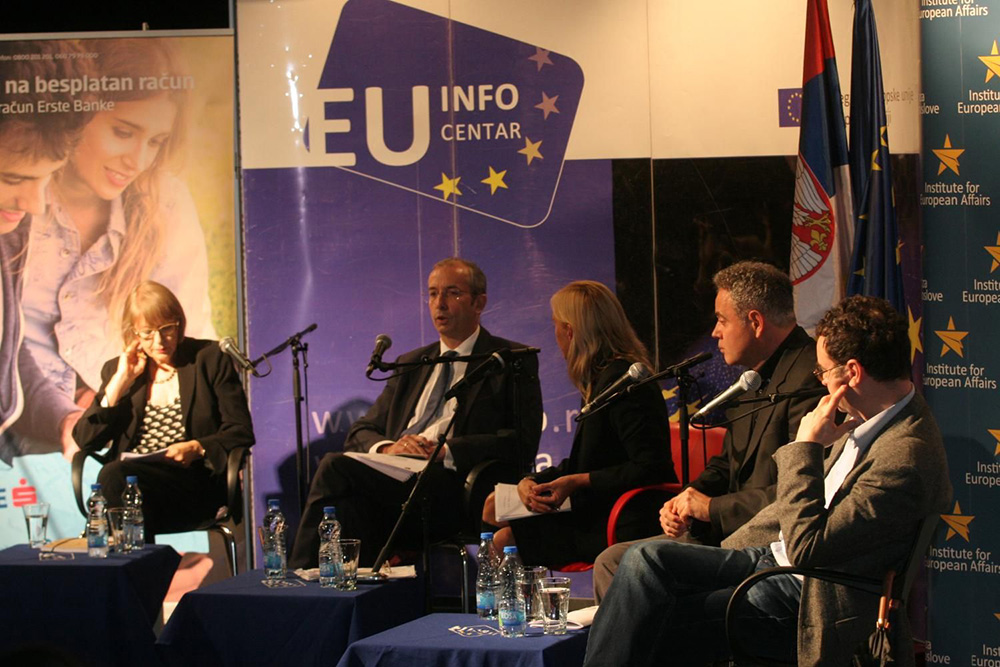Participants in debate “Serbia and EU – What Are Our Conditions” agreed that it was necessary to open negotiating chapters with Serbia as soon as possible, whereas Head of EU Delegation to Serbia Michael Davenport said chapters 32 and 35 were the most likely to be opened first.
Apart from Ambassador Davenport, sociologist Jovo Bakic, President of Helsinki Committee for Human Rights Sonja Biserko and associate of Institute for Social Sciences Zoran Lutovac took part in debate organised by Youth Education Committee (as of today known as Institute for European Affairs) with the support from EU Info Centre and American Embassy in Belgrade.
Davenport said that date of publishing the Progress Report on Serbia was still unknown. Asked whether recognition of Kosovo independence was a condition for Serbia’s EU accession, he said that the condition was to normalise Belgrade-Pristina relations. “The fact is that no country can join the EU without fulfilling all criteria, in Serbia’s case, each of the 35 chapters. 28 Member States unanimously agree that it is necessary to achieve comprehensive normalisation of Belgrade-Pristina relations,” Davenport said.
“I believe that first chapters would be opened by the year’s end which would then lead to opening of other chapters as well,” he said and added that Serbian Government was expected to adopt Action Plans on chapters 23 and 24 whose opening we could expect next year.
Davenport said the EU would not be complete without Serbia and other countries in the region and that democratic Serbia, respectful of standard and criteria, would make significant contribution to Europe.
Speaking about the next EC Progress Report on Serbia, Davenport said that Serbia would receive positive assessment where justified, with more specific inputs for specific measures, especially in the area of Justice. Asked about media reporting throughout election campaign and during the elections, Davenport said that the EU expressed its concern during previous elections, notably about media reporting.
Sociologist at the Faculty of Philosophy Jovo Bakic said by the end of 2015 chapters 32 and 35 would be opened, but that it meant nothing to him, because thus far, the EU has played irresponsibly. “Serbia is the only one being more irresponsible than the EU,” said Bakic. “Being a hardened pro-European, I am appalled by EU’s behaviour. Serbia is choosing to enter the EU with fascism crawling in,” he said referring to Greek, Hungarian and even British approach to refugee crisis. Bakic said he was committed to Europe as long as it had kept fascism off, because Serbia would certainly be worse without the Union.
Minister of European integration in Democratic Party shadow government and associate of Institute for Social Sciences Zoran Lutovac sad that current Government received support from international community because it proved it was ready to take relations with Pristina “one step further”. Those who have had excessive reactions to technical negotiations, now stand ready to make further steps, Lutovac said and added that, due to talks with Pristina, exceptions were made regarding the values such as freedom of expression and rule of law.
Lutovac said that public could benefit from opening of negotiations because it was a way to meet criteria, ensure efficient and independent justice system, create environment for freedom of speech and expression observance and hear different opinions on public broadcasting service.
President of Helsinki Committee for Human Rights Sonja Biserko also advocated earliest possible date for negotiations opening, particularly in view of chapters 23 and 24, because according to her, it would put institutions under control of the EU. She said that Serbian public was familiar with EU problems, but that it should be given a possibility to take part in reviewing the Union. Biserko believes “claims about imposing new conditions” are all false and the EU’s legal framework would bring benefits to all Serbian citizens.




